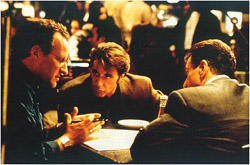 I have just seen Michael Mann's Heat, and, as k-punk says (here), it is a very 90's film. K-punk emphasizes the 'renouncing of the passions' which appears to be at the heart of proceedings. In fact, there is a constant tension between reason and sentimentality which not only provides a background to the action, but which also makes Heat the film it is.
I have just seen Michael Mann's Heat, and, as k-punk says (here), it is a very 90's film. K-punk emphasizes the 'renouncing of the passions' which appears to be at the heart of proceedings. In fact, there is a constant tension between reason and sentimentality which not only provides a background to the action, but which also makes Heat the film it is.Neil McCauley's twice uttered line, "don't let yourself get attached to anything you are not willing to walk out on in 30 seconds flat if you feel the heat around the corner," expresses a new sort of pragmatism; how would a professional thief act were he purely rational? This formalistic feel is heightened by the anonymous cityscapes and what goodie Vincent Hanna calls "dead-tech, post-modernistic bullshit" homes.
However, as the plot unfolds, we find that the clean break from the world of Mafiosi and blood feuds is nothing of the sort. Midway through, McCauley assumes the role of patron as he - forcibly - attempts to restore his crewmate's marriage. But perhaps the most striking piece of old-school banditry comes near the end when, approaching the airport, McCauley cannot resist going after a treacherous former crew-member.
We might say that Heat embodies the capitalist preference for Protestantism over Catholicism. Loyalty and family ties are not antithetical to the money-making project (as Mafia success amply demonstrates), so long as they aren't allowed to disrupt the order of business.
So we see that Heat does not break cleanly from its "Coppola and Scorcese gangter flick" predecessors, precisely because the characters populating this film are still struggling to break from their own criminal heritage.
No comments:
Post a Comment